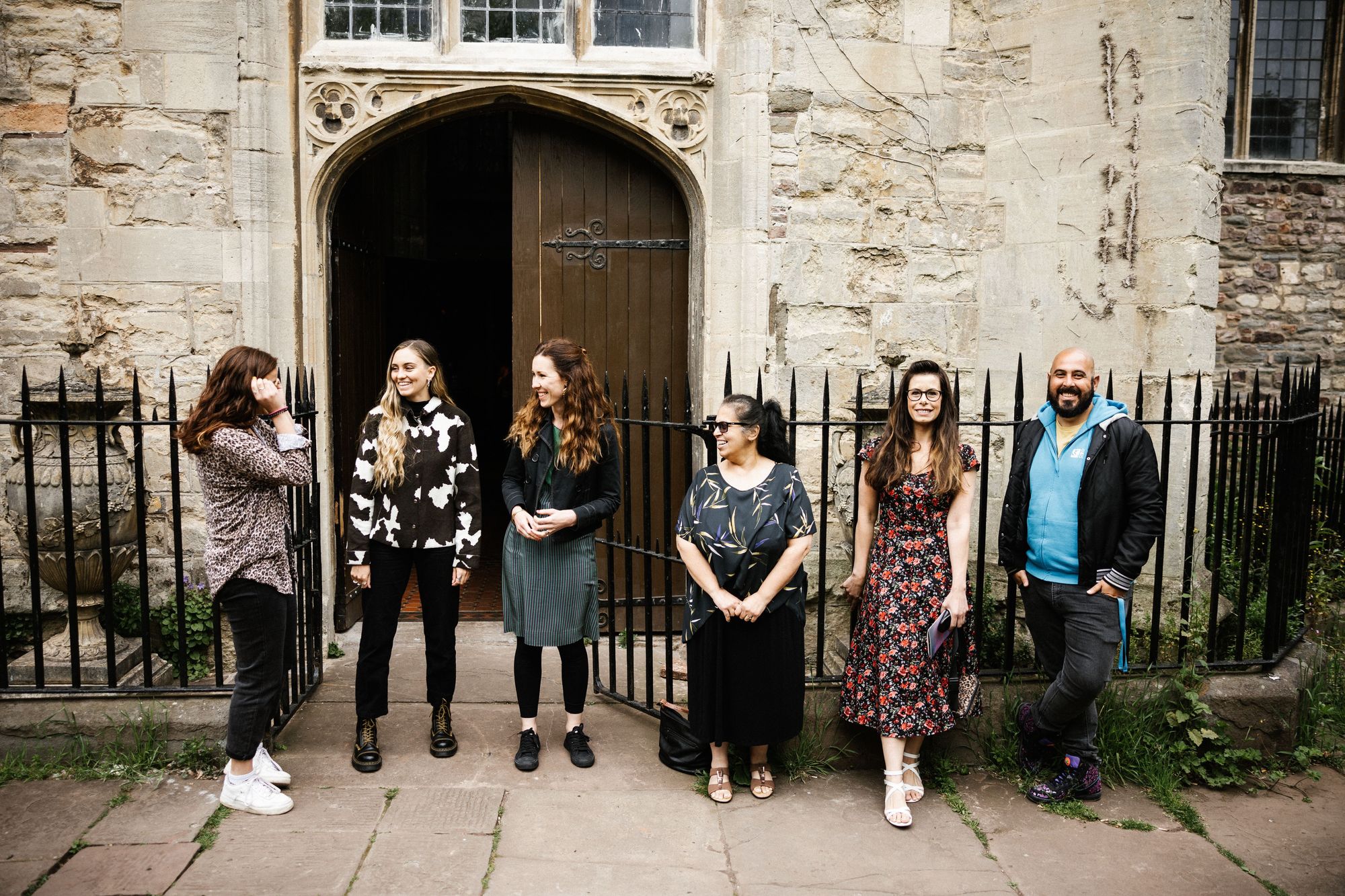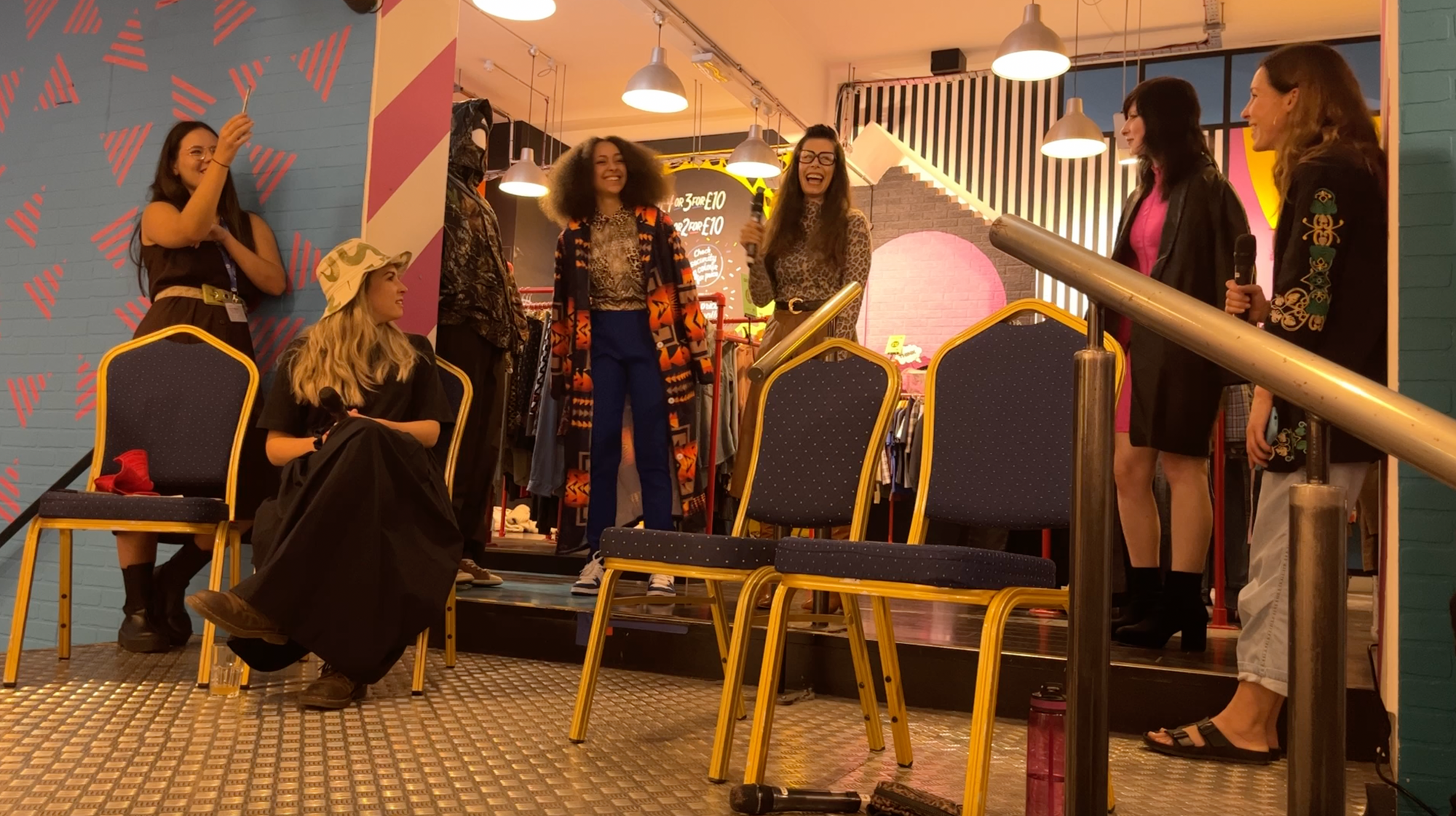By Lauren Sanderson & Lily Farrant, Features Editor & Deputy Editor
Charity shops, vintage, thrifted. Words which come to mind when thinking about the fashion movement that has taken over many Bristol students' style. It comes as no surprise then that Bristol is the birthplace of Sustainable Fashion Week (SFW), currently the only one of its kind in the UK. Founded by Amelia Twine, co-owner of non-profit organisation A Single Thread CIC, SFW works in community engagement to make sustainable fashion more accessible.
As part of the week’s events, Amelia hosted a panel discussion at Thrift Store on Park Street, featuring Meg Cox, a stylist from ladies’ clothing hire spot Clothemod, Jess Strain, designer for sustainable accessory brand Ovrbloom, and Maria Loria, founder of Sustainable Fashion as-a-Service brand WearMyWardrobeOut.

Epigram spoke to Amelia about some of the biggest challenges facing the sustainable fashion movement, the impact of trying to shop sustainably, and what can be done to increase diversity within the movement.
‘The narrative surrounding slow and sustainable fashion is changing, driven increasingly by consumer demand and awareness’, she said. Indeed, haunting statistics revealing that 93 per cent of brands don’t pay garment workers a living wage, or that it takes 2,700 litres of water to produce the amount of cotton for a single T-shirt, underline the social and environmental damage caused by the fast fashion industry.
Yet she explained that through a process known as greenwashing, many fast fashion brands, such as H&M or Zara, will promote themselves as improving their practices in order to appeal to the growing slow fashion market. In an attempt to promote true transparency between consumer and seller, panellist Jess Strain’s company Ovrbloom includes a QR code in her products; with a quick scan a customer can learn about their garment’s life, from cotton seed to bucket hat.
‘Re-wear, repair, repurposing. There are loads of different things we can do which don’t cost a lot of money and aren’t about buying something new.’
Considering sustainable fashion’s image, Amelia explained that ‘one of the problems is that for years it’s been seen as a niche thing for a small grouping of people, and we need to break through that’. The goal of Sustainable Fashion Week and the slow fashion movement is to encourage people to overhaul their relationship with fashion and clothing, promoting different entry points into sustainability. ‘Re-wear, repair, repurposing. There are loads of different things we can do which don’t cost a lot of money and aren’t about buying something new’.
The perception that the slow fashion movement is homogeneously represented and led by middle-class women is one that Amelia hopes to reorient by removing the barrier of inaccessible pricing: ‘We can make sure that we’re not charging people loads and loads of money to come and participate in whatever activity or offering—whether it's a clothes swap or a repair service—we try not to charge people to participate in any way’. Sustainable Fashion Week aims to counteract the rebranding of sustainable fashion as a consumer act through collective action, using creative community engagement to support local people to feel that sustainable fashion is accessible and relevant to them.
Amelia emphasised that engaging in sustainable fashion can happen on both a community level, organising clothes swaps with friends, and on a broader scale. Panellist Maria Loria explained the concept behind her online company, WearMyWardrobeOut, selling second-hand clothes as well as offering repair and tailoring services.

For Amelia, diversifying the voices of sustainable fashion diversifies the modalities through which we understand what sustainability looks like. She explained how A Single Thread moves its events and activities around the Bristol wards, taking a focus on priority wards with higher levels of deprivation.
From free upcycling workshops to clothes swapping events, their community events program invites Bristol’s local communities to host an event in their own regional space, amongst their own networks, to connect with them at a grassroots level. Amelia stressed the importance of taking a step back: ‘If you want to host an event to talk to your colleagues or your faith group, we invite you to participate. We promote what you’re doing, we showcase what you’re doing and we’ll share the platform with you’.
These efforts encourage sustainable fashion in a myriad of ways, yet price accessibility remains a problem, as many charity shops are forced to increase their prices to match those of online platforms like Depop—the mecca of resell platforms. Amelia affirmed that ‘charity shops need to stay really cheap’, and that ‘good quality, preloved and accessibly priced’ clothing need to be within everyone’s reach. She explained her concerns, reiterating that ‘people who need access to clothing shouldn’t ever be priced out because of style and trend’.
Depop, and platforms like it, have faced backlash for claiming an ethical narrative while acting as another link in the fast fashion product chain they openly advocate against
‘Sustainability’ is fast becoming the biggest buzzword in the fashion world, with online searches for ‘sustainable fashion’ tripling between 2016 and 2019. Yet the environmental effectiveness of the movement is ambiguous—is slow fashion just another instance of trend-based consumerism, furthering the demand for textiles, 85 per cent of which currently go to landfill each year?
‘It seems that for many, sustainable fashion is framed only as a purchase decision, something that you can only buy’, says findings from UWE Research Students. Amelia raised questions about the impact of resell platforms that frequently engage in fast fashion reselling of cheap, on-trend brands that largely mass produce in high-polluting factories—many of which have also faced alarming accusations of child labour and unethical working practices. ‘It just becomes another place to buy something “new”—buying preloved in that way just enables people to buy more and feel better about it’.
Despite self-defining as ‘a global community of buying, selling and connecting to make fashion more inclusive, diverse and less wasteful’, Depop, and platforms like it, have faced backlash for claiming an ethical narrative while acting as another link in the fast fashion product chain they openly advocate against. Are these platforms merely a paradigm of growing global consumerism and trend-obsession?
‘I wonder how much it is replacing the purchase of fast fashion because the preloved market is shooting up, but the projected growth of fast fashion is still really significant. People aren’t necessarily replacing one for the other’. Despite the recent redirection of the fashion world towards the sustainable sector, clothing production still doubled from 2000 to 2014, and the number of garments purchased per capita during the same period increased by about 60 per cent. According to the European Parliament, since 2000, European fashion brands have gone up from releasing just two new collections per year to up to 24. Billion-dollar fast-fashion retailer SHEIN reported a 250 per cent year-on-year increase in revenue in 2020.
Sustainable Fashion Week launches in Bristol this weekend
The gentrification of the ‘Depop girly’
Fearing that resell platforms were being used in tandem with the continued purchase of fast fashion, Amelia doesn’t want the sustainable approach to clothing to be seen as a lifestyle choice: ‘It’s not about middle-class women spending more money on nice, new things which are beautifully and perfectly produced’.
‘Representation is a big thing, but it can’t stop there, it needs to go way beyond. We need to see people in all of their glorious variety participating in sustainable fashion and leading the narrative on it. And also being paid to do that, and honoured throughout the whole process’.
Featured Image: Epigram / Katie Spall








